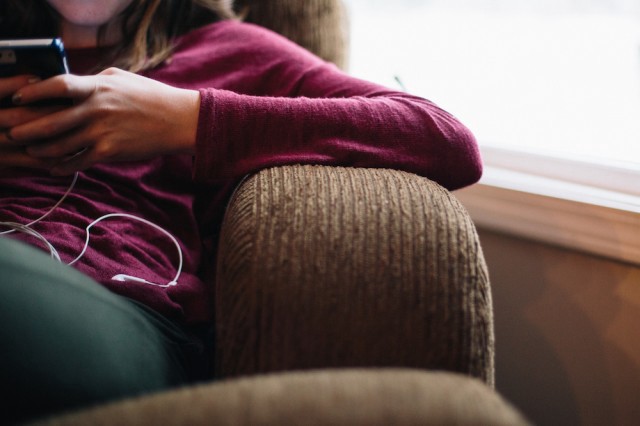All the Internet I Need Is on My Smartphone
by Paula Burke

I didn’t set out to be a super-cord-cutting millennial, but I don’t have a landline, cable, or Internet access at home. I do, however, have an Internet connection through my cellphone’s data plan that manages to get me everything I need (and sometimes things I want). Surprisingly, I’m not alone — “I don’t have the Internet” is the new, “I don’t have cable.”
This is according to a new report out by the Pew Research Center: “Nearly 1 in 5 Americans rely on a smartphone for accessing the Internet either because they ‘do not have any other form of high-speed Internet access at home’ or because they have a ‘limited number of ways to get online other than their cell phone.’ And 7 percent have neither broadband service nor other alternatives for going online other than their smartphone, whom Pew refers to as the ‘smartphone-dependent’ users.”
Although I used to get a fair amount of glee from announcing that I hadn’t seen that show on Netflix or that funny video on YouTube because “I don’t have the Internet,” I do wish I had even a shaky Wi-Fi connection. When I moved into my first apartment without roommates last May, I tried to hook up the utilities only to discover that the previous tenant hadn’t disconnected any of her services. It took me weeks to straighten out the electric and gas bills, especially since the electric meter was assigned an address that barely resembled my mailing address.
Internet access, at first, seemed to be more straightforward. Big Internet Company agreed to connect my apartment for a not-outrageous monthly fee, and they were set to send me an installation package. Later it turned out that they were unable to disconnect the previous tenants account with Big Internet Company 2, and the management company wasn’t interested in helping me prove that I was a different person from the previous tenant. Once this was resolved weeks later, the customer service representative said, “Now what was it you were trying to get?” Apparently they didn’t have my original order on file anymore, and the deal that I had previously signed up for was no longer available. She tried to sell me a more expensive plan, and I lost it. I told them that not only was I canceling, I never wanted to speak to them again.
Enter my data plan. I had a 4 GB/month plan at $100 a month that had previously more than covered my very occasional Instagram post and obsessive email checking. Alone in a new city, however, I was reliant on it for directions, locating stores, setting up bill payments, and everything else someone normally does on a broadband connection, like streaming music and movies and Googling potential medical issues.
I was able to, relatively cheaply, up my data allowance to 10 GB/month at $125 a month. I get text alerts when I reach 75% and 90% of my data, although that only happened the week I got the flu and watched the entire first season of “High Maintenance” on my phone (worth it).
Most of the time, I’m able to do what I need within this limit. I have become really sensitive to the usability of mobile sites, and if it’s sluggish or loads incorrectly, I don’t use it often. I use an RSS feed app to scroll through the news without loading pages fully, and I send lots of things to Pocket, which also scrubs pages of ads and large images. My cellphone provider allows me to set up a personal hotspot, and I connect my laptop to it if I need to do something that requires a full screen (like email this article to The Billfold).
Mostly, people wonder how I live without Netflix. The answer: I read a lot of books.
In general, smartphone-dependents are: young, low-income, and non-white with low levels of education attainment. I suppose I meet two of the four descriptors (young and low-income), but I’m relatively tech-savvy. I can also take my laptop to the library or a coffee shop if I want to use the Internet for longer periods of time, which I’ve done for things like software updates. Not everyone who relies on a cellphone data plan has access to these resources, and I’m also able to afford a lot of data.
According to the Pew study, nearly half of these users have had their cell phone service interrupted for financial reasons. Slightly more than half have reached their data limit at least once. These users are also less likely to have a bank account, health insurance or own their own home, compared to users less reliant on smartphones. They tend to use their data plan to access job applications and public transit directions, and are less likely to use “luxury” apps.
The UN has declared Internet access a human right, and my experience with setting up broadband has made me think that it should be treated more as a utility. It’s definitely a privilege to adopt the attitude that my lack of access is a cultural statement, and it’s only because I have other resources that I’m able to make this claim.
Paula Burke is a bookseller in Chicagoland. She tweets sometimes.
Support The Billfold
The Billfold continues to exist thanks to support from our readers. Help us continue to do our work by making a monthly pledge on Patreon or a one-time-only contribution through PayPal.
Comments